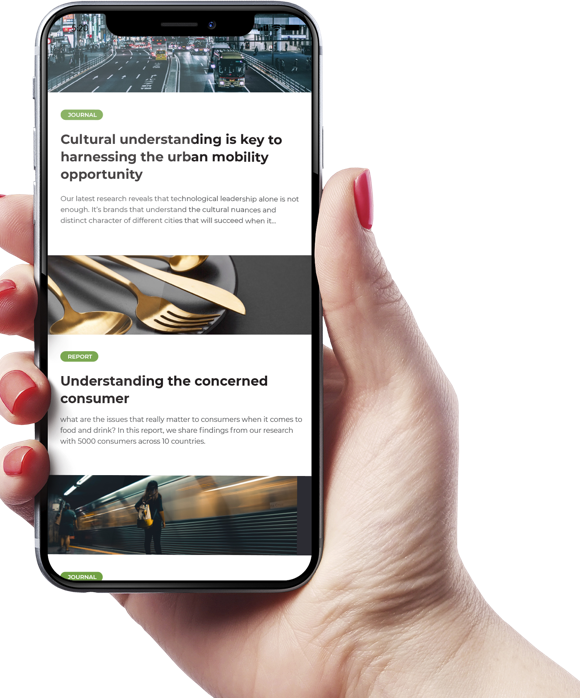Urban mobility is a lucrative space. It’s no wonder that brands as diverse as Audi, Baidu and Amazon are all clamouring to get their hands on the opportunity.
Much of the debate around the future of urban mobility has focused on technology. But our latest research reveals that technological leadership alone is not enough. It’s brands that understand the cultural nuances and distinct character of different cities that will succeed when it comes to developing new urban mobility solutions.
We conducted research with over 5000 commuters in 13 cities which closely match our global footprint: London, Berlin, Singapore, Shanghai, Jakarta, Manilla, Ho Chi Minh City, New York, Los Angeles, Hong Kong, Mumbai, Delhi and Tokyo. As part of the research, we tested a number of future urban mobility concepts with commuters across the globe. These ranged from futuristic ideas like air taxis to a green scheme designed to reward environmentally friendly commuting behaviours.
Meeting consumer needs is not enough. Commuters want to see urban mobility solutions that address the distinct needs of their city.
We found that the appeal of different mobility concepts is very much dictated by the prevailing city culture. When asked about different concepts, commuters’ responses were rooted in their own experience of travelling in that city, leading them to reject some concepts outright. “In the case of Tokyo, putting the environment first is impossible” one respondent told us. “For the traffic conditions in Jakarta, cars like these are not suitable” another said.
Now of course, it’s natural that prevailing conditions and infrastructure will dictate what people can conceive realistically being implemented in their own cities. But what is interesting for brands is that the research clearly demonstrates that understanding consumer needs on a global level is not enough. A more granular approach is necessary as whilst consumers do assess new solutions based on the benefits they’ll deliver for them personally, a more important factor in consideration is whether the concept will work for their city.
Get regular insights
Keep up to date with the latest insights from our research as well as all our company news in our free monthly newsletter.

Broader cultural differences have a strong influence on concept response
Another key finding was that broader cultural differences play an important role in how commuters respond to new concepts. For instance, when we tested the concept of premium car hire, we uncovered diametrically opposing views in Eastern and Western markets. We found that commuters in New York and LA were much more accepting of the idea of commuting in style, whereas in Tokyo and Singapore, the concept was seen to be unnecessary.
This research demonstrates the importance of understanding and addressing cultural differences when designing future mobility solutions. A one-sized-fits-all approach simply will not fly. Brands that seek to understand the different cultural and city nuances and then use this to inform proposition development will be those that find favour with commuters – and that will be able to harness the urban mobility opportunity to its full potential.
Want to find out which concept resonated best in your own market? Get in touch with your local office and we’d be happy to take you through the full research findings.




 Senior Marketing Executive
Senior Marketing Executive Sales & Marketing
Sales & Marketing General Manager PR -Internal Communications & Government Affairs
General Manager PR -Internal Communications & Government Affairs Vital Strategies
Vital Strategies
 Customer Intelligence Director
Customer Intelligence Director